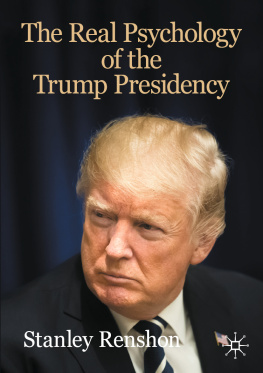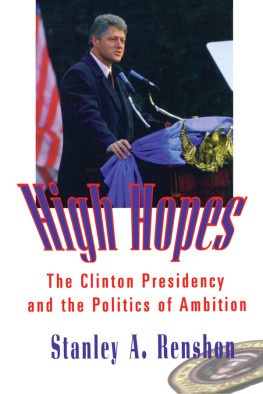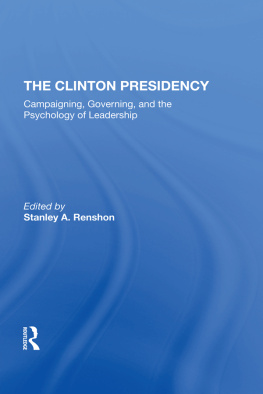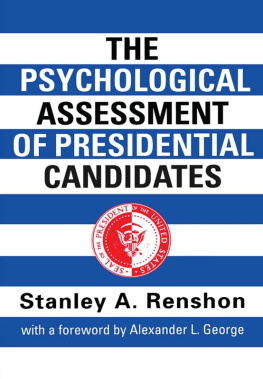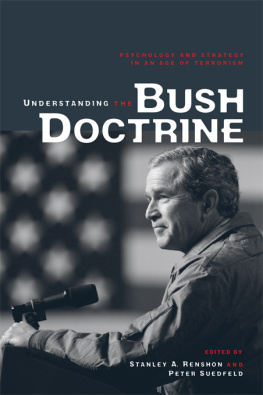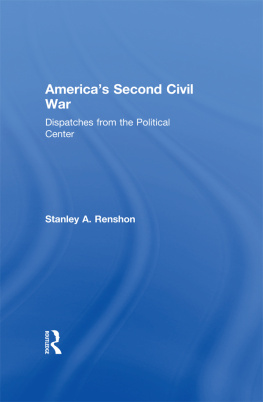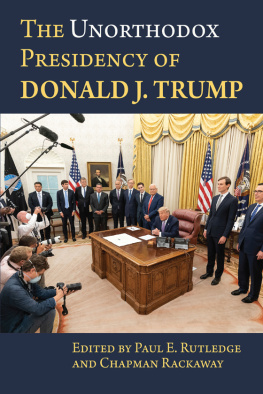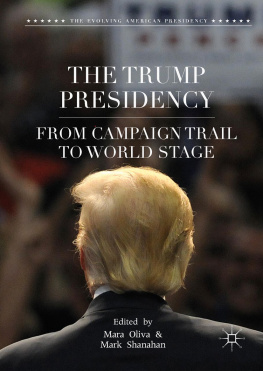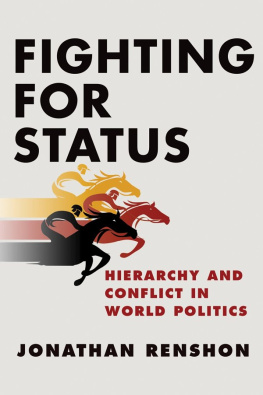Stanley Renshon - The Real Psychology of the Trump Presidency
Here you can read online Stanley Renshon - The Real Psychology of the Trump Presidency full text of the book (entire story) in english for free. Download pdf and epub, get meaning, cover and reviews about this ebook. year: 2020, publisher: Springer International Publishing, genre: Politics. Description of the work, (preface) as well as reviews are available. Best literature library LitArk.com created for fans of good reading and offers a wide selection of genres:
Romance novel
Science fiction
Adventure
Detective
Science
History
Home and family
Prose
Art
Politics
Computer
Non-fiction
Religion
Business
Children
Humor
Choose a favorite category and find really read worthwhile books. Enjoy immersion in the world of imagination, feel the emotions of the characters or learn something new for yourself, make an fascinating discovery.
- Book:The Real Psychology of the Trump Presidency
- Author:
- Publisher:Springer International Publishing
- Genre:
- Year:2020
- Rating:3 / 5
- Favourites:Add to favourites
- Your mark:
- 60
- 1
- 2
- 3
- 4
- 5
The Real Psychology of the Trump Presidency: summary, description and annotation
We offer to read an annotation, description, summary or preface (depends on what the author of the book "The Real Psychology of the Trump Presidency" wrote himself). If you haven't found the necessary information about the book — write in the comments, we will try to find it.
The Real Psychology of the Trump Presidency — read online for free the complete book (whole text) full work
Below is the text of the book, divided by pages. System saving the place of the last page read, allows you to conveniently read the book "The Real Psychology of the Trump Presidency" online for free, without having to search again every time where you left off. Put a bookmark, and you can go to the page where you finished reading at any time.
Font size:
Interval:
Bookmark:

This series is stimulated by the clash between the presidency as invented and the presidency as it has developed. Over time, the presidency has evolved and grown in power, expectations, responsibilities, and authority. Adding to the power of the presidency have been wars, crises, depressions, industrialization. The importance and power of the modern presidency makes understanding it so vital. How presidents resolve challenges and paradoxes of high expectations with limited constitutional resources is the central issue in modern governance and the central theme of this book series.
More information about this series at http://www.palgrave.com/gp/series/14437

Cover credit: Drop of Light/shutterstock.com
This Palgrave Macmillan imprint is published by the registered company Springer Nature Switzerland AG
The registered company address is: Gewerbestrasse 11, 6330 Cham, Switzerland
For our wonderful new granddaughter Mira
May her life be filled with love, courage, strength, and accomplishment
And knowing her parents, were sure it will be
The purpose of this book is to provide a more accurate analysis and understanding of an unusual and unprecedented president, Donald J. Trump, his real psychology, and his extremely controversial presidency.
When he first announced his candidacy, I thought he had little, if any chance of winning the nomination and said so in an interview. However, as Trumps campaign took hold and he stumbled and lurched past one candidate and then another, I began to realize that not only might he have a chance, but that he was a truly unique candidate who seemed to be tapping into some very deep and powerful political currents that only he of all the candidates seemed to see and understand.
As a psychoanalyst who studies presidential leadership and a political scientist who specializes in the presidency, how could I not be interested? I was. Actually, I was much more than interested. I was genuinely curious and puzzled.
How could a presidential candidate with no political backgrounda bombastic, brazen, and incredibly confident man who violated every rule of political decorum and breached every assumption of how to win a presidential campaign, prevail? It was clear that people across the country responded to Trump as if they had found an oasis in a large desert of political contrivance, dishonesty, and ineffectiveness. In some respects, they had.
Others felt quite differently. Mr. Trumps surprising and wholly unexpected election to the presidency resulted in a vitriolic emotional and political reaction among his detractors that has not subsided. Indeed, it is remarkable both for the level of its intensity and its longevity.
I am well aware of those currents both personally and professionally. However, throughout this research, a deep interest and genuine puzzlement as to how Trumps nomination, general election campaign, and presidency would play out helped me to maintain a general state of emotional and political calm even as anti-Trump vitriol has exploded across almost all aspects of public debate about this unprecedented presidency, and Trump engaged in his latest provocation to establishment assumptions and power centers assumptions.
Standing apart from the emotional maelstrom, and obscured by the presidents own theatrics and his opponents excesses, one can notice that President Trump has built a substantial presidential record. It has, of course, been substantially effected but surprisingly not yet been wholly interrupted by the traumatic impact of the Coronavirus both domestically and abroad and the ferocious opposition he has faced since before he entered office. Whether, against enormous political and historical odds, including an unprecedent modern world-wide pandemic, and the traumatic impact of the tragic death of George Floyd and the peaceful demonstrations and riots that followed, it is possible for Mr. Trump to accomplish his presidential purposes, ambitions that I analyze in this book as the Politics of American Restoration is one basic question this analysis attempts to answer.
A second major question underlying this book is about Mr. Trump himself, and his leadership style. What real capacities and deficiencies does Mr. Trump actually bring to his presidential leadership? Enormous numbers of observations about his very real deficits abound. Yet, many of them are harsh, speculative, and devoid of evidence beyond critics confident assertions. Fair minded, substantive, comprehensive, and accurate analyses of Mr. Trump and his presidency are extremely rare, and therefore much needed.
This books third and final underlying question is this: Trumps Politics of American Restoration is an effort to become a reconstructive president in Stephen Skowroneks terms. That restoration is premised on Trumps effort to engage and reform (as he sees it) eight pillars of establishment assumptions, thinking, and policy: the courts; economic growth and opportunity (including jobs and energy development); de-regulation; health care; immigration; foreign policy; trade; and lifting the fear of discussing many political debate topics (aka political correctness). All of these areas contain a great many discrete policies within them. He is, at the same time, trying to change and reform several major institutions, both domestically (eg., FBI, CDC, DOJ) and abroad (eg., WTO , WHO, NATO). It would be difficult for any president, much less a president in Trumps political circumstances, to successfully accomplish these monumentally ambitious set of goals. Trump must answer the questions, and so must we: How do longterm entrenched policy narratives change, and is it possible for Trump to successfully do so?
Font size:
Interval:
Bookmark:
Similar books «The Real Psychology of the Trump Presidency»
Look at similar books to The Real Psychology of the Trump Presidency. We have selected literature similar in name and meaning in the hope of providing readers with more options to find new, interesting, not yet read works.
Discussion, reviews of the book The Real Psychology of the Trump Presidency and just readers' own opinions. Leave your comments, write what you think about the work, its meaning or the main characters. Specify what exactly you liked and what you didn't like, and why you think so.

